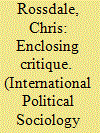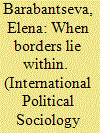|
|
|
Sort Order |
|
|
|
Items / Page
|
|
|
|
|
|
|
| Srl | Item |
| 1 |
ID:
146137


|
|
|
|
|
| Summary/Abstract |
The concept of ontological security has received increased attention in the security studies literature over the past ten years. This article develops a critical perspective toward ontological security and its mobilization by IR scholars, arguing that substantive ethical and political resources are produced by resisting the terms of ontological security/insecurity. It argues that the aspiration to ontological security, to contiguous and stable narratives of selfhood, can (violently) obscure the ways in which such narratives are themselves implicated in power relations. Furthermore, it argues that attempts to order political life into an ontological/security episteme disciplines or marginalizes modes of subjectivity which resist the closure of ontological security-seeking strategies. The article engages queer figurations of subjectivity as mobilized by Judith Butler, Donna Haraway, and Jack Halberstam, as well as examples from anti-militarist social movements, to demonstrate traditions which refuse and resist the framework of ontological security. It does this both in order to highlight particular practices and strategies that are written out by an epistemology oriented around ontological security/insecurity, and to show how a resistance to such ordering can enliven political action in various ways.
|
|
|
|
|
|
|
|
|
|
|
|
|
|
|
|
| 2 |
ID:
146133


|
|
|
|
|
| Summary/Abstract |
This article contributes a different approach to discussions of resilience and resistance by arguing that within the current literature, there is too little attention to how communities may engage in their own resilience building without outside intervention or interference. Further, this article will argue that the literature which poses resilience as fundamentally different from resistance overlooks the ways in which resilience can be seen as a tactic of resistance through the lens of infrapolitics. The article uses the Palestinian example of sumud to illustrate these two points. Sumud is a tactic of resistance to the Israeli occupation that relies upon adaptation to the difficulties of life under occupation, staying in the territories despite hardship, and asserting Palestinian culture and identity in response to Zionist claims which posit Israelis as the sole legitimate inhabitants of the land. Sumud represents a “resilient resistance”—a tactic of resistance that relies on qualities of resilience such as getting by and adapting to shock. Thinking about sumud as a form of resilient resistance challenges the resilience literature to engage with a greater variety of forms of resilience.
|
|
|
|
|
|
|
|
|
|
|
|
|
|
|
|
| 3 |
ID:
146135


|
|
|
|
|
| Summary/Abstract |
Scholarly interest in the camp has grown over recent years, inspired in part by Giorgio Agamben's (1995; Homo Sacer: Sovereign Power and Bare Life) work. Scholarship in this area has built on Agamben's view of the camp as an abject space of exception and bare life but also, in reaction to this view, has theorized the camp as a political and social space which constitutes refugees and displaced persons as political subjects, active in demanding rights and social justice. Building on existing scholarship, this article draws attention to another important trend in the camp which has emerged alongside the growing activism of refugee populations, dissatisfied with their lack of rights and abject conditions. This is the trend of engaging refugees to become self-governing in the management of the camp, to think of the camp in terms of community development, with camp life providing the experiences through which refugees are to refashion themselves as resilient, entrepreneurial subjects. Our analysis examines this trend through the issue of humanitarian emergency governance of refugees and IDPs and within the context of reforms undertaken by the United Nations—specifically, through what we term “resiliency humanitarianism.” We use this term to suggest a particular rationale of care, camp coordination, and management which emerges within neoliberal government and which focuses on assisting refugees and IDPs to adapt to, and survive, crisis with the aim of responsibilizing them.
|
|
|
|
|
|
|
|
|
|
|
|
|
|
|
|
| 4 |
ID:
146134


|
|
|
|
|
| Summary/Abstract |
In this article, I am concerned with the political agency available to victims of wartime violence, and the subsequent insights it generates for thinking about complicity and responsibility. The article first considers the problematic ways in which victims are cast in the discipline of transitional justice, drawing on interdisciplinary studies of gender, agency, and wartime violence. I conceptualize the political as relational and situated within a web of human relationships that make life meaningful. Political agency includes acts, gestures, and words that negotiate the value of human life within various relationships. To illustrate, I turn to the life story of Sara, a young woman who grew up in the context of prolonged conflict in northern Uganda. I conclude with thinking about how Sara's acts of political agency move us beyond static categories of victims in transitional justice, and conceive of responsibility as diffuse and socially held.
|
|
|
|
|
|
|
|
|
|
|
|
|
|
|
|
| 5 |
ID:
146131


|
|
|
|
|
| Summary/Abstract |
Violent Jihadist movements have increasingly produced online English language magazines in order to encourage young Muslims into terrorism. This article argues that sociological approaches to the study of these magazines should engage with theories of political myth, understood as the collective “work” on dramatic and figurative narratives which provide significance to the political conditions of social groups. The utility of this approach is demonstrated through an analysis of al-Qaeda's online magazine, Inspire. Targeted toward an alienated young Western Muslim readership, Inspire stylistically mimics Western magazines by using satirical representations of politicians and making references to popular culture. The authors seek to convince their readership that they are part of a violent conflict with Western “crusaders” and treacherous false Muslims. Through a rhetorical strategy of “legitimization via proximization,” perceived injustices committed by the purported enemies of Islam throughout the world are seen as direct attacks on the reader and all Muslims. The reader must sacrifice his/her livelihood in order to become a “hero” and defend the Umma against its enemies. The article concludes that the mobilizing potential of the work on myth in these magazines necessitates further research.
|
|
|
|
|
|
|
|
|
|
|
|
|
|
|
|
| 6 |
ID:
146136


|
|
|
|
|
| Summary/Abstract |
This article examines the changing geopolitical realities which have redefined the nature of sovereign governance on the Sino-Vietnamese border. The binary forms of classification in a rigidly and clearly delimited Sino-Vietnamese borderland replace the ambiguous space of “zomia,” with its fluid and overlapping identifications. This dynamic context sets the conditions for local communities and their long-standing tradition of ethnic marriages straddling the borders of China and its neighboring states. In order to understand how, and why, the status of previously accepted forms of undocumented ethnic marriage has recently changed from “common” (shishi) to “illegal” (feifa) in two ethnic Yao villages, I look at various factors. These include how state discourses on marriage migration in Asia, biopolitical concerns about population security in China, and regional iterations of the global anti-human trafficking campaign, come into play in forceful ways to shape the geopolitical regime of the Sino-Vietnamese borderland and redefine the terms of legitimate practices, thus reconfiguring ethnic marriages as illegal.
|
|
|
|
|
|
|
|
|
|
|
|
|
|
|
|
|
|
|
|
|